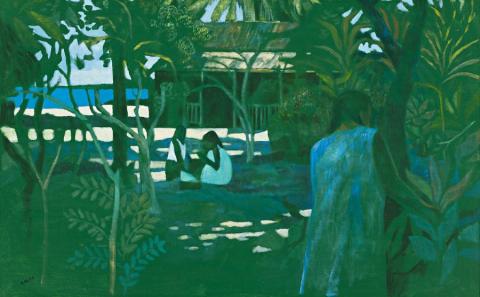WOMAN IN A GARDEN, MOOREA, c.1972
RAY CROOKE
oil on canvas on board
75.0 x 121.0 cm
signed lower left: R Crooke
titled and inscribed verso: WOMAN IN /GARDEN / MOOREA / R.0002C
Private collection, Melbourne
North of Capricorn: The Art of Ray Crooke, Perc Tucker Regional Gallery, Townsville, 21 November 1997 – 4 January 1998 then touring to Cairns Regional Gallery, Cairns, 16 January – 22 February 1998; Gladstone Regional Art Gallery and Museum, Gladstone, 6 March – 18 April 1998; Customs House Art Gallery, University of Queensland, Brisbane, 12 June – 26 July 1998; Campbelltown City Bicentennial Art Gallery, Sydney, 7 August – 17 September 1998; and Drill Hall Gallery, Australian National University, Canberra, 1 October – 1 November 1998
Smith, S., North of Capricorn: The Art of Ray Crooke, Perc Tucker Regional Gallery, Townsville, 1997, p. 80 (illus.)
Ray Crooke's Woman in a Garden, Moorea depicts three French Polynesian women escaping the heat of the day under a lush canopy of tropical foliage. Painted with his characteristic simplicity, the figures are treated in the same manner as the flattened landscape, indicating a balance between the natural world and its inhabitants. The palette of blues and greens, highlighted by visible brushstrokes and complimentary touches of yellow, gives the painting its distinctive haze and produces a sense of the'heat induced lassitude'1 brought on by an enervating climate.
Ray Crooke's introduction to the tropical landscape began in 1940 when, at 18, he left his home in Victoria to join the Australian forces. Travelling with the army from Western Australia to Townsville, Cape York Peninsula and Thursday Island proved seminal for his developing artistic career. After completing his art studies at Swinburne Technical College in 1948, Crooke returned to the Northern Australia, making numerous painting trips throughout Cape York Peninsula, the Gulf country, Central Queensland and Western Australia.
Crooke is best known, however, for his works of the Pacific Islands, which he started painting intensively in the early 1970s. It is in the works from this period that the artist's wish to develop a romantic form of expression based on imagination and emotion is clearly expressed.2 Although there appears to be a distinct sense of place, these works are often composites of different locations. The artist simplifies and emotionally intensifies his landscapes, giving precedence to mood over action or narrative. As described by Frances Thomson, director of the Perc Tucker Regional Gallery,'There is, in Crooke's art, a sense of time suspended, of the human experience of the eternal in the present moment, which is underpinned by the lessons he has learned from the old masters.'3
Crooke's interest lies in capturing a way of life, and depicting humanity in harmony with nature. With its simplicity of form, predominantly monochromatic palette, and pastoral subject matter, Woman in a Garden, Moorea reflects Crookes desire to retain a sense of spirituality and simplicity often forgotten in the contemporary world.
1. Smith, S., North of Capricorn: The Art of Ray Crooke, Perc Tucker Regional Gallery, Townsville, 1997, p. 7
2. ibid, p. 12
3. ibid, p. 7
JESSICA O'BRIEN
